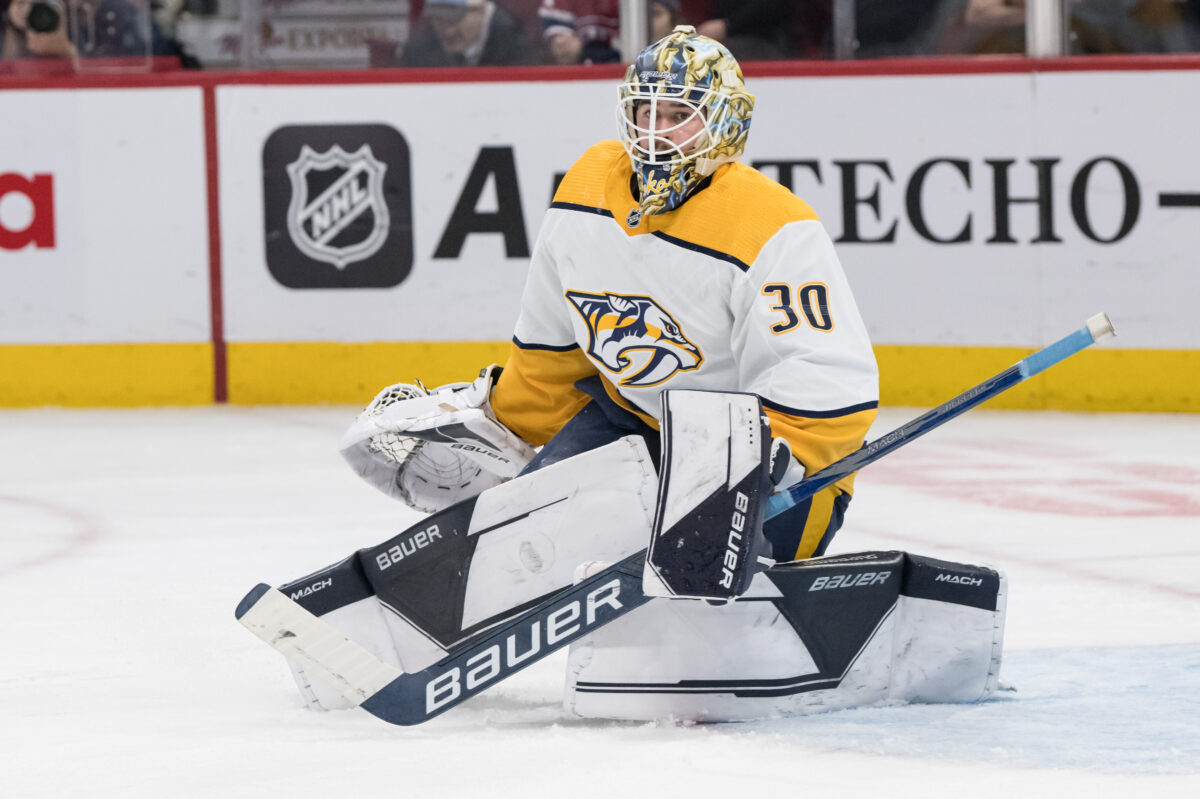The San Jose Sharks have made one of their biggest moves of the 2024 offseason, acquiring goaltender Yaroslav Askarov and some additional pieces from the Nashville Predators in exchange for two players and a conditional first-round draft pick. This trade is notable on its own due to Askarov’s status as one of the NHL’s most promising young goalies. However, it becomes even bigger considering that the return package centered around the chips the Sharks received in the Tomas Hertl trade at last season’s deadline. It was a dubious move at best for San Jose at the time but takes on an improved perspective following the Askarov deal. Though still not an ideal trade, it carries a different meaning five and a half months later.
Sharks Swap Hertl Trade Assets for Askarov
When San Jose sent Hertl to the Vegas Golden Knights back on March 8, it was a strange deal for a lot of reasons, not least of which was the pieces the Sharks got back. They obtained forward prospect David Edstrom and a 2025 first-round draft pick, both decent returns in a vacuum but an incomplete haul in the full scope of the trade, particularly because the Sharks also gave the Golden Knights two third-round picks.

But when the Sharks traded Edstrom, the draft pick and goaltender Magnus Chrona to the Predators for Askarov, the initial deal was viewed through a whole new lens. They have essentially flipped Hertl for arguably the top goalie prospect in the league — a risky proposition, but one that makes a lot more sense than the initial Hertl deal.
Hertl could’ve been a good veteran forward for the Sharks for many years, but the front office wanted to go in another direction with their rebuild. Indirectly turning him into an elite prospect is a good outcome, especially given his large contract. San Jose also got back a third-round pick in the trade, softening the one-sidedness of the deal with Vegas, and smartly put conditions on the first-round pick to account for the slim chance the Golden Knights win the 2025 Draft Lottery.
The Sharks organization probably doesn’t see the first trade as bad, but they showed a willingness to strive for improvement and seek out new opportunities. Thanks to that, they now have a possible franchise goalie.
Hertl Deal’s Salary Retention is Still Problematic
Although the Askarov trade alleviates some of the negative aspects of the Hertl trade, one element of the latter still looms large. The Sharks will be retaining salary on Hertl until the 2030 offseason, with all of their retention slots locked up through the end of this coming season and two slots taken until 2027.
Related: Grading San Jose Sharks’ Trade for Yaroslav Askarov
This doesn’t directly relate to the Askarov trade, but it does highlight the disparity between the two deals. In acquiring Askarov, the Sharks affirmed their status as a team looking to create flexibility and bring in young players. With Hertl’s salary retention, they limited their ability to do just that. When it comes to building up the defense that will play in front of Askarov, they still have a lot of work to do. They may soon want to acquire more young defensemen via trade to bolster their new young goalie, but their limits on retaining salary in turn limit the deals they might be able to execute.
Ever since Mike Grier took over as general manager, the Sharks have made a habit of trading veterans for young players and picks. They’ll likely make more such trades in the coming seasons to strengthen their prospect pool even further, but they’ve placed financial limitations on themselves in the process.
Sharks Use Hertl to Shore Up an Uncertain Area
Despite the issues that remain with the Hertl trade, the Askarov move holds more positives than negatives due to the uncertainties the Sharks faced at the goaltender position. The newly departed Chrona had his moments at the NHL level, but Askarov is an upgrade over him. Georgi Romanov has shown flashes of his ability, but not enough to establish himself just yet. Mackenzie Blackwood was San Jose’s best goalie last season but has struggled with inconsistency at a few points in his career, while Vitek Vanecek is coming off an injury that ended an already difficult year. Conversely, Askarov has excelled in the minor leagues while turning in mostly solid performances in his brief trips to the NHL.
Amid all of that, Askarov has a chance to rise and establish himself as the primary netminder in San Jose for many years to come. If that happens, the Sharks may look back on a controversial trade from March 2024 as the point where it began.
